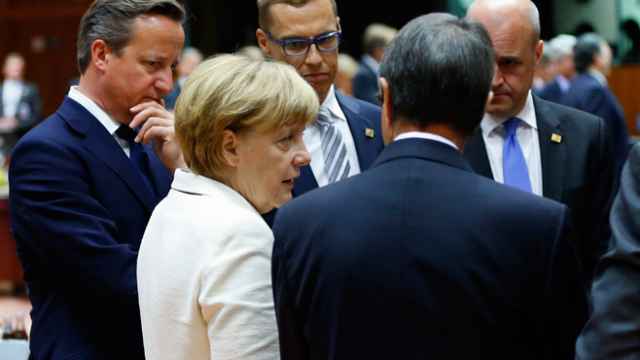European Union nations are rejecting for now the idea of sanctioning Russia's high-profile sports events, such as its hosting of the 2018 World Cup, as part of a new round of penalties on the country.
Diplomats from three member states said Wednesday that while the 28-nation group is considering sports sanctions against Russia for its involvement in Ukraine, it is unrealistic to think they will target big events.
They said ambassadors would more likely seek a deepening of current sanctions on individuals and companies in a round of new penalties they aim to have by the weekend. The diplomats spoke on condition of anonymity because the talks were ongoing.
The EU and the U.S. have so far imposed penalties against dozens of Russian officials and the financial and arms industry. The bloc's officials were looking whether a ceasefire agreed between Ukrainian President Petro Poroshenko and Russian President Vladimir Putin would hold, but there was no immediate indication that the fighting would stop.
Sporting sanctions against nations have often been fraught with difficulty. A Western boycott of the 1980 Moscow summer Olympics for the Soviet invasion of Afghanistan was not fully followed up and athletes and sporting federations appeared to be as hurt from them as the Soviet Union itself.
German Chancellor Angela Merkel's spokesman, Steffen Seibert, sounded skeptical about any such move for the World Cup.
"It is now 2014, the World Cup will happen in 2018, so I don't think that this is something we have to discuss here today," he said.
Instead, EU nations would seek to toughen the existing measures, which also included an export ban for some high technology and oil exploration equipment, Seibert said.
Soccer governing bodies FIFA and UEFA have both declined to punish Russia despite apparent breaches of their rules in recent weeks, including the Russian Football Union's attempt to integrate clubs from Crimea, which Moscow annexed in March, into its competitions.
UEFA was urged by Ukraine's football federation to act against Russia before high profile matches this month.
UEFA's ruling board is also likely to choose the Russian city of St. Petersburg on Sept. 19 as one of 13 host cities for its Euro 2020 tournament.
And even if EU nations decide on some sporting sanctions, for example on soccer, they would face sporting federations that have always insisted on not mixing with national politics.
A Message from The Moscow Times:
Dear readers,
We are facing unprecedented challenges. Russia's Prosecutor General's Office has designated The Moscow Times as an "undesirable" organization, criminalizing our work and putting our staff at risk of prosecution. This follows our earlier unjust labeling as a "foreign agent."
These actions are direct attempts to silence independent journalism in Russia. The authorities claim our work "discredits the decisions of the Russian leadership." We see things differently: we strive to provide accurate, unbiased reporting on Russia.
We, the journalists of The Moscow Times, refuse to be silenced. But to continue our work, we need your help.
Your support, no matter how small, makes a world of difference. If you can, please support us monthly starting from just $2. It's quick to set up, and every contribution makes a significant impact.
By supporting The Moscow Times, you're defending open, independent journalism in the face of repression. Thank you for standing with us.
Remind me later.





